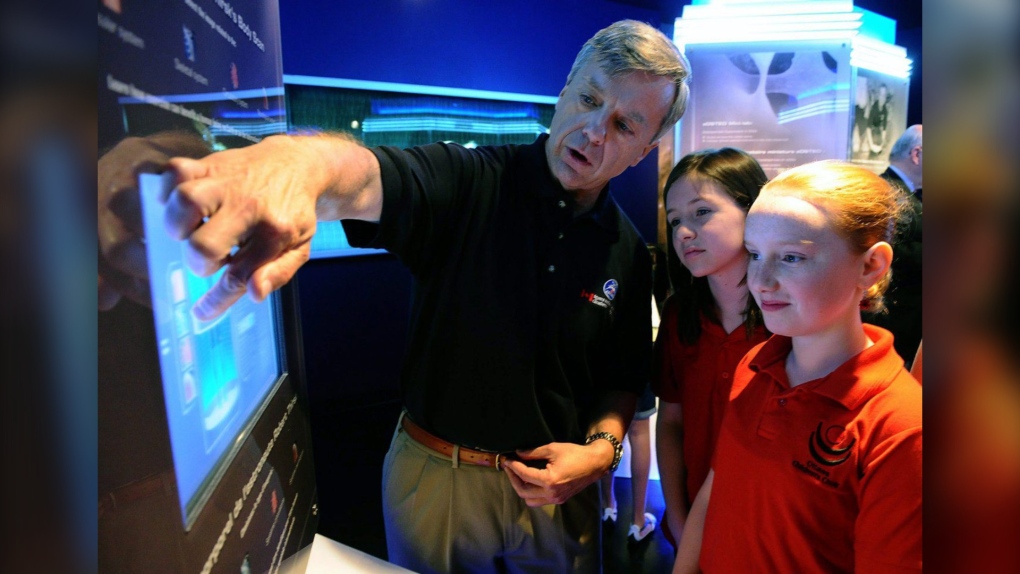'Permanent bone loss': Calgary study finds astronauts suffer on return to Earth
 FILE - Canadian astronaut Robert Thirsk talks with students from Rockcliffe Elementary School as they get a first look at The Living In Space exhibit during its unveiling at the Canadian Aviation and Space Museum in Ottawa on Thursday, May 12, 2011. (THE CANADIAN PRESS/Sean Kilpatrick)
FILE - Canadian astronaut Robert Thirsk talks with students from Rockcliffe Elementary School as they get a first look at The Living In Space exhibit during its unveiling at the Canadian Aviation and Space Museum in Ottawa on Thursday, May 12, 2011. (THE CANADIAN PRESS/Sean Kilpatrick)
The experience may be out-of-this-world but research indicates those who travel to outer space suffer from increased bone loss.
A study released Thursday from the Cumming School of Medicine at the University of Calgary followed 17 astronauts before and after their space flights.
The TBone study, conducted over a seven-year period starting in 2015, found that prolonged weightlessness accelerated bone loss in the astronauts.
"We found that weight-bearing bones only partially recovered in most astronauts one year after spaceflight," said Dr. Leigh Gabel, an assistant professor in the faculty of kinesiology and lead author of the study.
"This suggests the permanent bone loss due to spaceflight is about the same as a decade worth of age-related bone loss on Earth."
The researchers travelled to Johnson Space Center in Houston to scan the wrists and ankles of the astronauts before they left for space, on their return to Earth then after six months and one year.
The findings, published in Scientific Reports, said the loss happens because bones that would normally be weight-bearing on Earth, such as the legs, don't have to carry weight in a zero gravity setting.
"We've seen astronauts who had trouble walking due to weakness and lack of balance after returning from spaceflight to others who cheerfully rode their bike on Johnson Space Center campus to meet us for a study visit," said Dr. Steven Boyd, director of the McCaig Institute for Bone and Joint Health and professor in the Cumming School of Medicine.
"There is quite a variety of response among astronauts when they return to Earth."
The study found some astronauts who flew on shorter missions, under six months, recovered bone strength and density in the lower body compared to those who flew for longer durations.
As future space missions are exploring travel to more distant locations, the study's next iteration plans to look at the effects of even longer trips, to support astronauts who may one day travel beyond the International Space Station.
The University of Calgary's former chancellor and astronaut, Robert Thirsk, said he knows how difficult it can be to be back on solid ground.
"Just as the body must adapt to spaceflight at the start of a mission, it must also readapt back to Earth's gravity field at the end," he said.
"Fatigue, light-headedness and imbalance were immediate challenges for me on my return. Bones and muscles take the longest to recover following spaceflight. But within a day of landing, I felt comfortable again as an Earthling."
The study was funded by the Canadian Space Agency in partnership with the European Space Agency, NASA and astronauts from North America, Europe, and Asia.
This report by The Canadian Press was first published June 30, 2022.
CTVNews.ca Top Stories

DEVELOPING Live updates as Stormy Daniels testifies at Trump hush money trial
Adult film star Stormy Daniels will take the stand a second time Thursday as former U.S. president Donald Trump’s hush money case continues in Manhattan. Follow live updates here.
NEW Why these immigrants to Canada say they're thinking about leaving, or have already moved on
For some immigrants, their dreams of permanently settling in Canada have taken an unexpected twist.
Here are the ultraprocessed foods you most need to avoid, according to a 30-year study
Studies have shown that ultraprocessed foods can have a detrimental impact on health. But 30 years of research show they don’t all have the same impact.
NEW Capital gains tax change 'shortsighted' and 'sows division' business groups tell Freeland
Forging ahead with increasing Canada's capital gains inclusion rate 'sows division,' and is a 'shortsighted' way to improve the deficit, business groups are warning Finance Minister Chrystia Freeland.
Ontario man frustrated after $3,500 paving job leaves driveway in shambles
An Ontario man considering having his driveway paved received a quote from a company for $7,000, but then, another paver in the neighbourhood knocked on his door and offered half that rate.
Defence attacks Stormy Daniels' credibility as she returns to the stand in Trump's hush money trial
Stormy Daniels will return to the witness stand Thursday in Donald Trump's hush money trial as the defence tries to undermine the credibility of the porn actor's salacious testimony about their alleged sexual encounter and the money she was paid to keep quiet.
With contactless screening tech, this Toronto startup hopes to catch breast cancer early — and save lives
Amid evidence of rising breast cancer rates among young women in Canada, one Toronto startup is offering a contactless and radiation-free device that can help doctors identify suspicious changes in breast tissue. The company, Linda Lifetech, says this can lead to earlier detection of breast cancer.
Tornadoes tear through southeastern U.S. as storms leave 3 dead
Forecasters warned a wave of dangerous storms in the U.S. could wash over parts of the South early Thursday, a day after severe weather with damaging tornadoes and large hail killed at least three people in the region.
Police handcuff man trying to enter Drake's Toronto mansion
Toronto police say a man was taken into custody outside Drake's Bridle Path mansion Wednesday afternoon after he tried to gain access to the residence.































